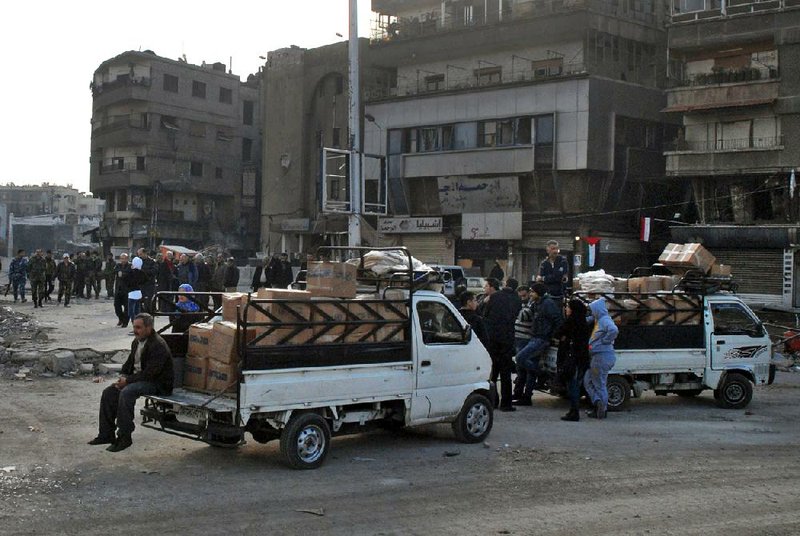BEIRUT - The United States accused the Syrian government Thursday of using stalling tactics to delay efforts to remove and destroy chemical agents, an indication that the international community’s patience is wearing thin over the slow pace of the operation.
The comments, delivered by the U.S. representative to the international chemical-weapons watchdog, marked some of the strongest public criticism of Syria’s commitment to relinquish its chemical stockpile.
Syria agreed to surrender its arsenal after a deadly chemical attack in August on a rebel-held suburb of Damascus raised the threat of punitive U.S. missile strikes. President Barack Obama has touted the agreement as a victory and a major policy achievement for his administration on Syria’s civil war.
The Organization for the Prohibition of Chemical Weapons is leading the mission to eliminate Syria’s 1,300-ton stockpile by a June 30 deadline.
Under the organization’s tight timeline, the most toxic chemicals in Syria’s arsenal were to have been removed from the country by Dec. 31, but that deadline was missed because of poor security amid Syria’s raging civil war as well as other factors. So far, just two small consignments of chemicals have been shipped out.
“The effort to remove chemical agent and key precursor chemicals from Syria has seriously languished and stalled,” Robert Mikulak told the organization’s 41-nation executive council in a closed meeting. His remarks were later posted on the State Department’s website.
Mikulak, who is the U.S. representative to the Organization for the Prohibition of Chemical Weapons, acknowledged that the timeline for the removal of Syria’s most dangerous chemicals was ambitious, but he expressed frustration that a month after the deadline “only 4 percent” of the chemicals has been removed “and the Syrian government will not commit to a specific schedule for removal.”
He called on Damascus to comply with the U.N. resolution for Syria to relinquish its chemical stockpile.
According to the timeline, all but 100 tons of chemicals are to be removed by Wednesday.
Mikulak said Damascus has cited security concerns for the delay in transporting the chemicals to the port city of Latakia for destruction abroad. But he dismissed Syria’s insistence on receiving additional security equipment, such as armored jackets for shipping containers and high-tech electronics, to secure the convoys, saying the demands were “without merit.”
“Syria’s requests for equipment and open-ended delaying of the removal operation could ultimately jeopardize the carefully timed and coordinated multistate removal and destruction effort,” he added. “For our part, the international community is ready to go.”
An American ship, the MV Cape Ray, is on its way to the Mediterranean Sea to pickup the most toxic chemicals in Syria’s stockpile, including mustard gas and raw materials for making sarin nerve agent. The Cape Ray is equipped with two machines that will render the chemicals inert.
Danish and Norwegian cargo ships are picking up the chemicals from Latakia and will transfer them to the Cape Ray in the Italian port of Gioia Tauro.
“There should be no doubt that responsibility for the lack of progress and increasing costs rests solely with Syria,” Mikulak said.
The Syrian government had no immediate comment.
The mission to rid Syria of its chemical arsenal is one layer in the country’s exceedingly complex and bloody civil war. The conflict, which began in March 2011 as largely peaceful protests before shifting into an armed insurgency, has killed more than 130,000 people, forced 2.3 million to seek refuge abroad and unleashed a devastating humanitarian crisis at home and across the region.
Meanwhile, Syrian negotiators in Geneva observed a minute of silence Thursday to honor the tens of thousands of people who have died in their country’s civil war - a rare moment of unity in talks marked by divisions and bitterness.
U.N. mediator Lakhdar Brahimi said the opposition delegation made the suggestion and the government negotiators agreed, as the talks neared the end of their first phase.
The observation was one of the few ice-breaking moments that have occurred during the peace talks, which have been stained over issues such as the opposition’s demand for a transfer of power in Syria.
The negotiations will end today and likely be followed by a week-long break.
On Thursday, the United Nations delivered hundreds of relief parcels to a besieged rebel-held Palestinian neighborhood in the Syrian capital that has suffered from crippling shortages of food and medicine for months.
Chris Gunness, a spokesman for the United Nations Relief and Works Agency that supports Palestinian refugees, said a convoy carrying 900 food parcels entered Yarmouk on Thursday morning. He added that despite “chaotic scenes,” by noon 720 parcels had been distributed.
“We are encouraged by the delivery of this aid and the cooperation of the parties on the ground,” Gunness said, adding that 18,000 Palestinians, including women and children, were in need of assistance.
Information for this article was contributed by Mike Corder, Albert Aji, Bassem Mroue, Yasmine Saker and John Heilprin of The Associated Press.
Front Section, Pages 6 on 01/31/2014


